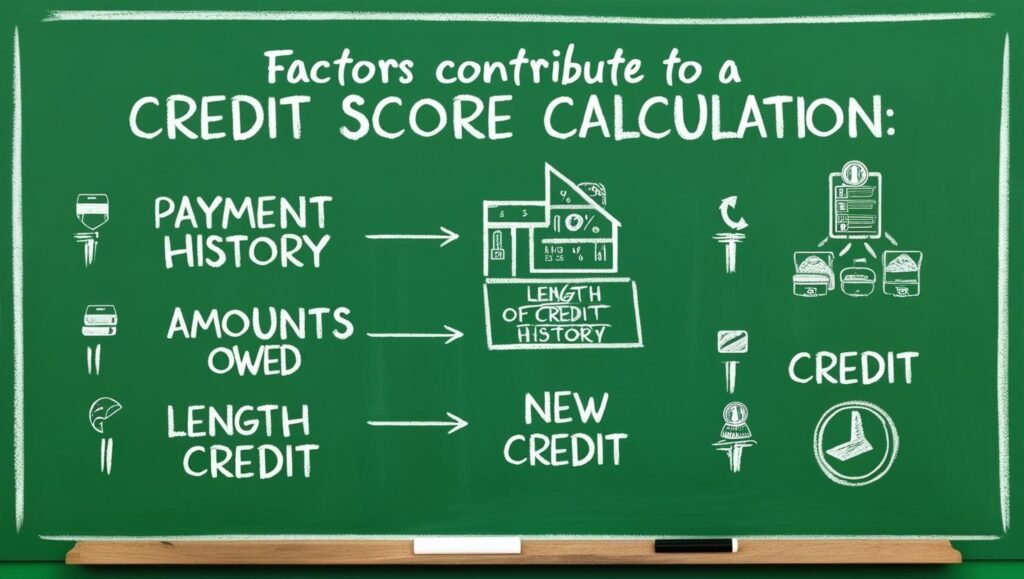
A credit score determines your probability of making on-time bill payments. When determining whether to approve you for a new account, lenders and creditors take your credit scores into account. The interest rate and conditions of the loan you are eligible for are also influenced by your credit score.
Credit bureaus use your credit history in their formula to calculate your credit score, which is a four-digit number. Although credit bureaus do not disclose their proprietary formula for calculating credit scores, it consists of five main components, each of which has a relative weight and varying degrees of importance:
When determining your overall score, which may range from 300 to 850, all of these categories are considered.
Understanding Credit Scores
A lot of people are surprised to know that they have multiple credit scores. There are many reasons why credit scores can differ, such as the provider of the score, the information used to calculate the score, and the method of calculation used.
Because not all lenders and creditors submit information to all three major credit bureaus, credit scores from Equifax, Experian, and TransUnion may also differ. Some may report to one, two, or none at all, but many do. Furthermore, the credit scoring models employed by the three main credit bureaus and by other credit score providers like FICO and VantageScore differ from one another.
Factors That Affect Credit Score Calculation
Payment History
Credit cards and all your loan payment history may be included in your payment history. Your payment history gives the fact that you do not miss your payments and provide information about bankruptcies, and how you have made payments against the debts that you have. Credit score algorithms often consider our payment history, the amount due, and how recently and frequently payments are missed. This is why payment history is considered to calculate your credit score.
Credit Utilisation Ratio
If you want your credit score not to get impacted and want to improve your credit score you should maintain a credit utilization ratio of 30-40% of your approved credit limit. Credit Utilization is a major factor in deciding your credit score.
Total Number of Accounts
The amount of accounts you owe is relative to the credit you have available. Having variety of credit products such as home loans, student loans, car loans, and credit card will help boosting your credit score. Hence, the total number of accounts you have is taken into consideration for credit score calculation.
Age of Credit
The age of your loan or credit card is directly proportional to your credit score. Do not close your old accounts even if you have paid off the debt. Lenders can make an informed choice about theater to grant you credit if you have a long credit history. That is the reason it is suggested that you maintain open older credit card account.
Factors that are not considered for Credit Score Calculation
It is necessary to realize that your credit score represents the details of your credit reports. Your leader or bank may take additional data into account while assessing your profile for a loan or credit card. There is other information that are not taken in consideration such as age, present salary, or tenure of employment while calculating credit score.
Mix of credits
If you have a good credit mix, it shows you can successfully manage different types of credit. Revolving credit (Credit cards, retail scorecards, gas station cards, lines of credit) and Installment loans (mortgages, auto loans, and student loans) should be a combination of these to improve credit score, it is not necessary to have every type of credit account.
How Often Is a Credit Score Calculated?
Typically, lenders provide information on a monthly basis, thus your credit score is computed and updated once a month. The frequency of updates may vary according to your circumstances and the lenders. No two credit scores are the same.
Conclusion
Your credit score has a significant impact on interest rates and loan approvals, making it a crucial component of financial wellness. It is predicated on open accounts, credit age, account mix, payment history, and credit use. Make on-time payments, maintain a healthy credit mix, and keep balances low to raise your score. To get greater financial chances, keep a close eye on your credit record and handle your credit responsibly.